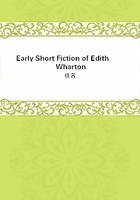
第29章
It was on an impulse hardly needing the arguments he found himself advancing in its favor, that Thursdale, on his way to the club, turned as usual into Mrs. Vervain's street.
The "as usual" was his own qualification of the act; a convenient way of bridging the interval--in days and other sequences--that lay between this visit and the last. It was characteristic of him that he instinctively excluded his call two days earlier, with Ruth Gaynor, from the list of his visits to Mrs. Vervain: the special conditions attending it had made it no more like a visit to Mrs. Vervain than an engraved dinner invitation is like a personal letter. Yet it was to talk over his call with Miss Gaynor that he was now returning to the scene of that episode; and it was because Mrs. Vervain could be trusted to handle the talking over as skilfully as the interview itself that, at her corner, he had felt the dilettante's irresistible craving to take a last look at a work of art that was passing out of his possession.
On the whole, he knew no one better fitted to deal with the unexpected than Mrs. Vervain. She excelled in the rare art of taking things for granted, and Thursdale felt a pardonable pride in the thought that she owed her excellence to his training.
Early in his career Thursdale had made the mistake, at the outset of his acquaintance with a lady, of telling her that he loved her and exacting the same avowal in return. The latter part of that episode had been like the long walk back from a picnic, when one has to carry all the crockery one has finished using: it was the last time Thursdale ever allowed himself to be encumbered with the debris of a feast. He thus incidentally learned that the privilege of loving her is one of the least favors that a charming woman can accord; and in seeking to avoid the pitfalls of sentiment he had developed a science of evasion in which the woman of the moment became a mere implement of the game. He owed a great deal of delicate enjoyment to the cultivation of this art. The perils from which it had been his refuge became naively harmless: was it possible that he who now took his easy way along the levels had once preferred to gasp on the raw heights of emotion? Youth is a high-colored season; but he had the satisfaction of feeling that he had entered earlier than most into that chiar'oscuro of sensation where every half-tone has its value.
As a promoter of this pleasure no one he had known was comparable to Mrs. Vervain. He had taught a good many women not to betray their feelings, but he had never before had such fine material to work in. She had been surprisingly crude when he first knew her; capable of making the most awkward inferences, of plunging through thin ice, of recklessly undressing her emotions; but she had acquired, under the discipline of his reticences and evasions, a skill almost equal to his own, and perhaps more remarkable in that it involved keeping time with any tune he played and reading at sight some uncommonly difficult passages.
It had taken Thursdale seven years to form this fine talent; but the result justified the effort. At the crucial moment she had been perfect: her way of greeting Miss Gaynor had made him regret that he had announced his engagement by letter. It was an evasion that confessed a difficulty; a deviation implying an obstacle, where, by common consent, it was agreed to see none; it betrayed, in short, a lack of confidence in the completeness of his method. It had been his pride never to put himself in a position which had to be quitted, as it were, by the back door; but here, as he perceived, the main portals would have opened for him of their own accord. All this, and much more, he read in the finished naturalness with which Mrs. Vervain had met Miss Gaynor.
He had never seen a better piece of work: there was no over-eagerness, no suspicious warmth, above all (and this gave her art the grace of a natural quality) there were none of those damnable implications whereby a woman, in welcoming her friend's betrothed, may keep him on pins and needles while she laps the lady in complacency. So masterly a performance, indeed, hardly needed the offset of Miss Gaynor's door-step words--"To be so kind to me, how she must have liked you!"--though he caught himself wishing it lay within the bounds of fitness to transmit them, as a final tribute, to the one woman he knew who was unfailingly certain to enjoy a good thing. It was perhaps the one drawback to his new situation that it might develop good things which it would be impossible to hand on to Margaret Vervain.